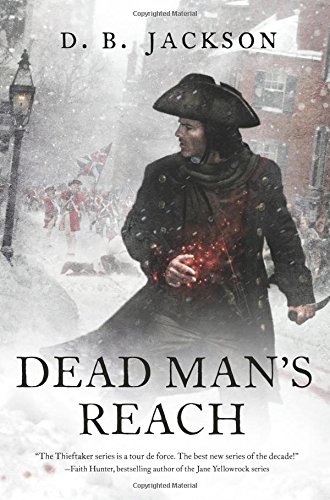
![]() Dead Man’s Reach by D.B. Jackson
Dead Man’s Reach by D.B. Jackson
Despite the series having some flaws, I’ve been a fan through the first three books of D.B. Jackson’s historical noir fantasy set in Pre-Revolutionary Boston and centered on the character of Ethan Kaille. In the fourth installment, Dead Man’s Reach, Jackson turns in if not a perfect novel, perhaps the best in the series. One which would also serve as an excellent close to Ethan’s arc, though I for one hope Jackson finds it in himself to give us more of Ethan’s adventures.
From the start, this story has played out against the backdrop of pre-war tension in the city, and now, having reached 1770, that tension will culminate in one of the most notorious scenes in American history — the Boston Massacre. Though in this world, with magic and “conjurers,” the events surrounding that moment are not exactly the stuff of your typical US history textbook. We open with what has become a frequent scene in the series — Ethan sparring with the other, more prominent thieftaker in town, Sephira Price. This scene takes a welcome turn into the unpredictable, however, when one of Sephira’s minions turns suddenly violent and, apparently under a spell of some sort, nearly kills someone. As Ethan races to track down the cause and the perpetrator, these attacks build in both power and frequency, instigating a spate of violence that threatens to set off the dry tinderbox that is occupied Boston. Complicating matters is Ethan’s own slow political evolution, as he finds himself caught, as he has in the past, between the two battling sides — the Loyalists, especially Thomas Hutchinson the lieutenant governor, and the Sons of Liberty, led by Samuel Adams.
Ethan’s character has always been one of the two main strengths of this series (alongside the historical element), and this continues here. I’ve said before how refreshingly pleasant it is to read a novel centering on a character who has already lived half his life (if not more) by the time the story starts. This is a character with a deep and burdensome past, a burden whose weight is not dependent on a singular “traumatic” event meant to motivate the character but on a rich patchwork of a full life’s experiences, both good and ill. And the specifics of that past have a lot to do with the events of Dead Man’s Reach. But Jackson keeps his eye as much on the future as well, and so the long, slow arc of Ethan’s life continues to bend — his political stance, his relationships with his love Kannice, his young friend (no longer so young) Diver, his bête noire Sephira, even his relationship with his chosen profession — all these have evolved and deepened since we first met this character. As Ethan thinks at one point: “change was coming to Boston, to all the colonies.” Ethan is both part of that change and also mirrors it, and here in what may serve as the capstone to the series, Jackson has created his richest, most fully human tapestry.
As mentioned, the twin strength to Ethan’s character is the historical aspect of the series, and with the conflict ratcheting up greatly here, leading to what we all know will eventually be war in a few years’ time, that backdrop adds a permeating and disturbing sense of urgent tension, as well as a wonderfully thrumming sense of inevitability. As when, for instance, Ethan walks past a group of British soldiers and “several times heard men speak of using their muskets the next time they were accosted by gangs of toughs, but he thought this more bluster than anything else.” Jackson does an excellent job here, perhaps his best in the series, of weaving his fiction throughout the actual historical events: riots, the death of a young boy, protests, and of course the Massacre itself. And two historical personages we’ve met before, Sam Adams and Thomas Hutchinson, both make several appearances.
If the main character and the historical background have been the two strengths of the series, the plotting and the magic system have been two of the weaker elements. This is true in Dead Man’s Reach as well, but to a lesser extent than in the prior books. For the most part, the plot is tightly constructed, moves apace, and again, has a great sense of tension and urgency. One character is a bit too forgetful with regard to one particular concept, while another a bit too easily helpful, allowing the reader to feel perhaps the too-heavy hand of the author in these moments. The villain, meanwhile, as has been the case once or twice before, is a bit too broadly drawn for my liking Finally, things do unravel a bit in the big climactic finish, both bogging down and also feeling too abrupt at times, but it’s all over so quickly, and I’d enjoyed so much of the book to that point, that I honestly didn’t care all that much.
As for the magic, which has never quite felt wholly nailed down for me, seeming at times too broad and too arbitrary in its usefulness/uselessness, here the magic itself plays a key role in the problem to be solved, rather than simply being a means to resolution of the problem, and for the most part it all works quite well, though again, it seemed a bit wobbly in the climax and, as usual, the healing spells get a bit more usage than I’d prefer, though there are several excellent scenes where Jackson employs healing (or its lack) to particularly strong emotional effect.
My reviews of the first three books have ranged from 3.0 to 3.5, but in what may be his last Ethan Kaille novel, Jackson, I think, has produced his best work yet (thus the four-star rating). Which makes it easy to both recommend the series as a whole to any readers who have yet to start it (though why you’d be reading the review of book four I’m not sure) and to ask Jackson if we could please get one or two more, sirrah?



These had fallen off my radar (and my TBR list), but I stumbled across a neat post on the author’s blog last week, and now I have your review. It’s reminding me that I want to read these!